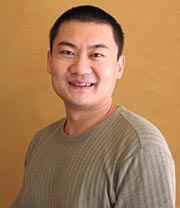The Helen Hay Whitney Foundation has awarded a prestigious Whitney Fellowship to UCSC postdoctoral researcher Ting Wang. Wang is conducting research in bioinformatics with David Haussler, professor of biomolecular engineering and director of the Center for Biomolecular Science and Engineering (CBSE). The fellowship will support Wang for three years of research on regulatory networks for gene transcription.
"Receiving this fellowship shows a recognition for the kind of research I want to conduct and for the environment in which I want to do it," Wang said. "Getting this fellowship further convinced me that I made a good choice to join the Haussler group at UCSC. The Whitney Foundation has a history of funding researchers at the top universities in the top groups."
The foundation focuses on support for basic biomedical research through postdoctoral research fellowships. Wang's proposed research in the relatively young field of computationally driven regulatory genomics represents a new approach that has changed the way modern genomics research is done, he said.
Wang came to UCSC in September 2006 from Washington University in St. Louis, where he earned his Ph.D. in computational biology. At Washington University, he investigated the regulation of DNA transcription, the process by which a gene sequence on the chromosome is copied to a "messenger RNA" molecule that carries the genetic instructions to other components of the cell. In Haussler's lab, Wang is continuing to study transcriptional regulation, although the focus of his work has changed.
"This is the most fundamental regulatory mechanism," he said. "When and where the genome message is expressed is controlled by transcriptional regulation. It is fundamental to understanding life, and it impacts physiology and human diseases."
Differences in the regulation of gene transcription probably underlie many of the differences between species as well as those between individuals of the same species, Wang said. Comparing genomes between individual humans reveals differences in single nucleotides (the As, Cs, Gs, and Ts of the genetic code) and variations in the number of copies of particular nucleotide segments. These variations result from events that leave the genome with nucleotides substituted, inserted, or deleted. Since most of these variations reside outside of genes, scientists suspect that they mostly affect gene regulation.
In graduate school, Wang used data about the origin and evolution of species -- phylogenetic data -- to identify the binding sites for individual transcription factors. When a transcription factor binds to a binding site, the factor then interacts with general transcription machinery for either activation or repression of a gene.
In higher organisms, things can get more complicated. Because proteins interact with each other, combinations of transcription factors acting at more than one binding site determine the fate or expression of a gene. So Wang has moved on from simply identifying individual transcription factors to looking for arrays of transcription factor binding sites that can convey identifiable expression patterns.
An array of binding sites that interact with each other forms a module -- a composition of a variety of signals. Wang hopes to elucidate the relationship between regulatory modules and the targets they regulate. Discerning these connections will lead to an understanding of the network of cascading interactions that determines the fate of a cell or an organism.
The emphasis on evolutionary genomics in the Haussler laboratory has expanded Wang's appreciation of how transcription factors work. Exploring how binding sites and modules have evolved aids in understanding their function. Understanding the evolution of transcription factors may reveal regulatory differences responsible for some human diseases. Transcript regulation could be fundamental to disease susceptibility, Wang said.
"If mistakes occur at one of the steps, the cell may go to a completely different fate. Some may become cancer. This has direct implications to human diseases," he said. "I don't expect to be able to answer this by myself. It will require a lot of scientists to add to the body of knowledge about regulation. I am just trying to tackle the problem from one angle."
Whitney fellows, their scientific advisors, and a few other selected scientists and Whitney trustees attend a two- to three-day meeting each year to present and discuss their research. Wang said he looked forward to attending this meeting, which offers valuable networking opportunities.
"One of the main things the foundation does for its members is to create a framework for collaboration. Collaboration is the key to success these days," he said.
Before coming to the United States, Wang was a biology student at Peking University in Beijing, China. He earned a master's degree in computer science while working as a medical research technician at Washington University because he thought it would launch his biology career in a different direction. He didn't know that one day he would be doing computational biology until he was halfway through the master's degree.
"That's when the genome project blossomed, and I found myself very well equipped to go after that path," he said.
The Whitney Foundation supports early postdoctoral research training in all basic biomedical sciences. To attain its ultimate goal of increasing the number of imaginative, well-trained, and dedicated medical scientists, the foundation grants financial support of sufficient duration to help further the careers of young scientists engaged in biological or medical research. The foundation awards 20 three-year research fellowships annually -- more than 900 since its inception.
Five current UCSC faculty members are former Whitney fellows: Thomas Schleich, professor of chemistry and biochemistry (1968); William Sullivan, professor of molecular, cell and developmental (MCD) biology (1985); Douglas Kellogg, professor and chair of MCD biology (1991); Theodore Holman, professor of chemistry and biochemistry (1991); and Melissa Jurica, assistant professor of MCD biology (2000).



